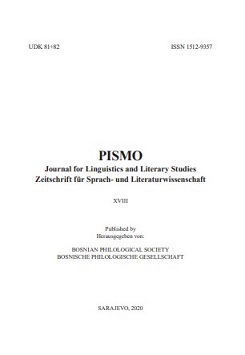Teorijska ishodišta i postavke kritičke analize diskursa
Theoretical Origins and Principles of Critical Discourse Analysis
Author(s): Mirsad TuranovićSubject(s): Semiotics / Semiology, Sociolinguistics, Cognitive linguistics, Post-War period (1950 - 1989)
Published by: Bosansko filološko društvo
Keywords: systematic functional linguistics; critical linguistics; poststructuralist criticism; discourse; unequal power relations; manipulation; demistification;
Summary/Abstract: This paper presents the development path and theoretical principles of critical discourse analysis (CDA). In the first part, the question of the influence of systems functional linguistics (SFL) on the theoretical assumptions and methodological framework of the CDA is discussed. CDA takes over from SFL a setting about the language as a reservoir or set of options available to the speaker. At the same time, every use of language implies the choice of a language form, and that choice is socially conditioned. By insisting on the dialectic of linguistic and social structures, SFL makes a departure from the formalistic approaches that had been dominant in linguistics until then. What distinguishes CDA from SFL is its critical attitude towards socially-conditioned language use. CDA takes this critical impulse from the critical linguistics that a group of researchers from the University of East Anglia began to develop in the late 1970s. In addition, the development of CDA has been significantly influenced by poststructuralist criticism, from which CDA derives emancipatory ambitions. In the last part of the paper, Fairclough’s model of the triad structure of discourse analysis is presented, composed of text, discursive practice, and sociocultural practice.
Journal: Pismo - Časopis za jezik i književnost
- Issue Year: 2020
- Issue No: 18
- Page Range: 9-22
- Page Count: 14
- Language: Bosnian

